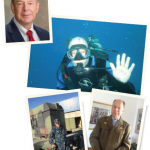Meanwhile, Dr. Meehan tried to keep his mind and body in shape. Every day, he ran for one hour around a loop inside the military compound with a gas mask at his side and read everything he could find about intensive care medicine, because he was assigned to the ICU.
Fortunately, he says, the hospital never reached capacity. Best of all, not one patient who was treated in his Fleet Hospital died.
Back to Civilian Life
Nearly three months after arriving in Bahrain, the war ended, and Dr. Meehan returned home to his family and job at the University of Colorado Medical Center. He served as an assistant professor and then an associate professor in the school’s rheumatology division and also received NASA and Department of Defense (DOD) grants to conduct immunology and rheumatology research similar to that he had performed in Houston.
Five years after the Gulf War, he was remarried to a woman named Jane, a widow with three children whom he had known from their church in Houston. Now supporting five children, Dr. Meehan found a more lucrative position at Kaiser Permanente as a rheumatologist and general internist. But he says the job wasn’t a good fit, and after three years, he joined the medical staff in 1999 at NJH as its only rheumatologist.
Many years went by as he continued his research, treated patients and built up the hospital’s rheumatology division, which now supports six rheumatologists.
‘The effect of environmental stress, whether it’s prisoner of war or combat training, high altitude or space flight, affects the T cell function more than the B cell function.’ —Dr. Meehan
In Harm’s Way
In September 2007, Dr. Meehan was deployed once more, this time to the Al Anbar Province in western Iraq. As the senior medical officer, his year-long assignment involved taking care of the medical needs of a battalion of 542 Seabees, the Navy’s Construction force assigned to the Marine Expeditionary Forces. Approximately 15 Navy corpsmen were assigned to him.
Before deployment, they were stationed at Port Hueneme Naval Construction Base in California for several months, receiving combat training. He also completed an intensive, 19-day Navy trauma medical course in the emergency department at the University of Southern California (USC) Medical Center that involved 18-hour workdays in the cadaver lab, lectures and treating patients who were victims of gang-related shootings.
“It was a very good experience for me,” he recalls. “I felt very confident that once I went to Iraq, I could do whatever was necessary to save the life of a critically injured Seabee. Nothing decreases stress more than being prepared.”
